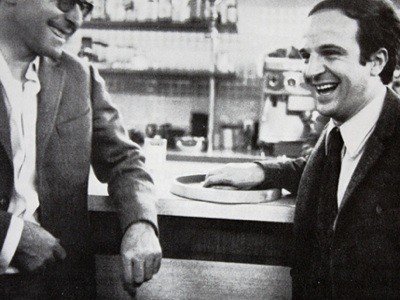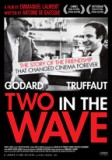| Reviews & Columns |
|
Reviews DVD TV on DVD Blu-ray 4K UHD International DVDs In Theaters Reviews by Studio Video Games Features Collector Series DVDs Easter Egg Database Interviews DVD Talk Radio Feature Articles Columns Anime Talk DVD Savant Horror DVDs The M.O.D. Squad Art House HD Talk Silent DVD
|
DVD Talk Forum |
|
|
| Resources |
|
DVD Price Search Customer Service #'s RCE Info Links |
|
Columns
|
|
|
Two in the Wave

Emmanuel Laurent's Two in the Wave begins and ends with the iconic closing images of Turffaut's The 400 Blows--young Antoine Doinel, running on the shoreline, then stopping to gaze toward the camera, which freezes and pushes in. It's a powerful moment in that brilliant film, a perfectly-captured illustration of the fear and uncertainty of adolescence's end. Seen in the framework of this documentary telling of the French Nuevelle Vague movement, it represents parallel moments of uncertainty for its creator, the great Francois Truffaut. Two in the Wave begins with his triumph at the 1959 Cannes Film Festival--a festival he had been banned from a mere year before--where The 400 Blows began this fierce new movement in French film with the force and power of a starter pistol. It ends with the bitter falling-out of Truffaut and his friend and contemporary Jean-Luc Godard, the brilliantly subversive filmmaker whose politics ultimately overtook his filmmaking and drove a wedge between the pair. In between, it tells the story of how the two men, and their fellow French cinephiles, changed the landscape of film the world over.
Laurent's film works best on the most basic documentary level--it tells a fascinating story, and it digs up some great clips. We see Truffaut and his young star, Jean-Pierre Léaud, at that first Cannes festival. We see the Truffaut and Godard fighting their final common cause, backing the "May 1968" protestors at that year's Cannes festival. And we see interviews, many interviews, Truffaut at Cannes, Godard interviewing Fritz Lang ("You know my films better than I do," Lang laughs), shocked viewers of Godard's Breathless ("It's not serious, not serious at all!"), Truffaut and Godard arguing theory with passion and fierce intelligence, a sunglass-clad Godard commenting wryly, always too cool for the room.
Two in the Wave is most intriguing as a cultural study of how the French New Wave came to be, and how it shook up the modern cinema. Not only does the viewer get a real sense of how Cahiers du cinéma (which Truffaut, Godard, and several critics-turned-New-Wave filmmakers wrote for) prompted "a cultural rebirth" for cinema in France, but how these "young Turks," dubbed the "Hitchcock-Hawks clan" by Cahiers co-founder André Bazin, championed their specific influences (Rossellini, Welles, Renoir, Bergman). What's more, we see how they sponged up those influences--including the parallelism of specific shots--and merged them with their own sensibilities to create their postmodern style (their characters loved cinema as much as they did, as seen in a clever montage of people in their movies going to the movies).
But it is primarily the story of the two filmmakers, "brothers in the cult of cinema," originally united in their mutual admiration (Truffaut calls Godard "the greatest filmmaker in the world" and contends that "there's cinemas before Godard and cinema after Godard") and common causes (not only May 1968, but fights against censorship and in favor of Henri Langlois' reinstatement to the Cinémathèque Française) before their divergence in the late 1960s; Godard "goes radical", while Truffaut continues to hone his skills as a craftsman and more traditional storyteller. When their friendship ends, it gets personal and ugly, with poor Léaud, who acted in pictures for both men, stuck in the middle, the child of their divorce. The conflict comes to a head with Godard's nasty (and nonsensical) critique of Truffaut's Day for Night (and Léaud's work in it), and Truffaut's scathing 20-page response, in which he writes to his former friend, "I think you're acting like a piece of shit." This is fascinating stuff, and Laurent delves into all the gossipy details while remaining admirably neutral--you'll likely side with whomever you prefer, whether you think Truffaut had become a staid bore or (like me) you feel like just about anything Godard produced after Weekend was borderline unwatchable.
The storytelling is involving, though the technique is sometimes questionable--interview subjects who should be identified are often not, and Laurent utilizes a peculiar B-roll device, accompanying much of the narration with footage of a pretty young French actress Islid Le Besco (familiar to those of us unfortunate enough to have seen The Good Heart) looking through old photos, newspapers, and issues of Cahiers, or going out to the cinema. It's an odd choice that doesn't really play; some of his other tricks (like a clever biographical sequence where her hands lay down, in front of the camera, a perfectly timed series of accompanying photographs) land more smoothly. Clips are mostly well-chosen, but there are a few befuddling exclusions (there's neither a mention nor frame of Godard's Band of Outsiders, which many viewers--myself included--consider a seminal picture of the movement). And the ending feels somewhat abrupt--the film seems to shut down just as our interest is at its highest. Those objections aside, Two in the Wave is a rich and intriguing film, and a feast for film buffs.
Jason lives in New York. He holds an MA in Cultural Reporting and Criticism from NYU.
|
| Popular Reviews |
| Sponsored Links |
|
|
| Sponsored Links |
|
|
| Release List | Reviews | Shop | Newsletter | Forum | DVD Giveaways | Blu-Ray | Advertise |
|
Copyright 2024 DVDTalk.com All Rights Reserved. Legal Info, Privacy Policy, Terms of Use,
Manage Preferences,
Your Privacy Choices | |||||||










